- Home
- David Downing
Silesian Station (2008) Page 14
Silesian Station (2008) Read online
Page 14
The pancakes were delicious, and the Germans were still waiting for the waiter when he finished. From little acorns...
He took a tram back to the New Town, alighting on Na Poikopi at the bottom of Wenceslas Square. He walked on to the post office intending to use one of the public telephones there but had second thoughts when he noticed German uniforms in a room behind the counters. Masaryk Station, he decided. Secret agents always used stations.
The booths in the corner of the concourse seemed ideal. He took the last in the line because it offered the widest angle of vision, and rummaged through his pockets for the right coins. After dropping and recovering the piece of paper, he spent several seconds deciding which of the two numbers to call, in the end plumping for the second - the name that went with it was easier to pronounce.
A woman answered.
'Oto Nemec?' he asked.
A garbled burst of incomprehensible Czech.
'Oto Nemec,' he said again. 'Is he there?' he asked, first in English and then in German.
There was a loud click as the woman hung up.
Russell did the same, not knowing whether to laugh or cry. The Americans hadn't mentioned the possibility of language difficulties, and he'd foolishly assumed that they knew the contacts spoke English or German. He had committed the cardinal sin - expecting intelligence from Intelligence.
He dialled the second number. It rang a long time, and he was about to hang up when a hesitant male voice mumbled an answer.
'Pavel Bejbl?' Russell asked.
'Bejbl,' the man answered, correcting his pronunciation. 'I am Bejbl.'
'Do you speak English?' Russell asked. 'Sprechen zie deutsch?'
'I speak German.'
'I'm an American. Gregor in Chicago gave me your name.'
'Gregor Blazek?'
'Yes.'
There was a pause. 'Have you a message for me?'
'Yes, but I need to deliver it in person. Could we meet?'
Another pause, longer this time. Russell could hear a whirring noise in the background - a fan, probably. 'Today?' Bejbl asked. He didn't sound enthusiastic.
'Around six? You pick the place,' Russell said, in an instantly regretted attempt at reassurance.
'Do you know Strelecky Island?' Bejbl asked, suddenly sounding more decisive.
'No.'
'If you're looking from the Charles Bridge, it's just upstream. The Legii Bridge goes over it - there are steps on the southern side. There are benches at the northern end of the island. I'll be there at six-thirty.'
Russell could picture the spot. 'How...' he began, but the line had gone dead. He hung up the earpiece and re-examined the piece of paper. The third potential contact - Stanislav Pruzinec - lived in Vysoeany. Wherever that might be. Russell went back out onto the concourse and read through the platform departure boards, finding what he wanted above the entrance to Platform 2. Vysoeany was the fifth stop out on the line to Hradec Kralove.
A train was waiting, but so was the Acting Prime Minister. Tomorrow, he told himself. If he had the time. And sufficient inclination.
It was almost half-past twelve. He took a tram back to Wenceslas Square and walked up to the Europa. He felt depressed by the future that Kenyon had unrolled for him, the sheer unrelenting predictability of it all. Wars between classes might just replace one set of pigs with another, but they had some underlying point to them. Wars between nations, as far as Russell could see, had absolutely none.
The receptionist was reading Kafka's Metamorphosis.
'Enjoying it?' Russell asked in English as he took his key.
The man shook his head in wonderment. 'What a writer!'
'He used to work near here, didn't he?'
'You do not know?' The man scurried out from behind his desk, gesturing for Russell to follow. He crossed the road, still wildly waving an arm, and when Russell joined him in the wide central reservation pointed down towards the next intersection. 'That building on corner. He work there. See window on corner, third floor. Our greatest writer! Europe greatest writer! And he wrote about America too!'
Russell imagined Kafka hunched behind the glass, racoon eyes staring out. The man had been writing about Nazi Germany and Stalin's Russia before they even existed. Small wonder he got depressed. 'A great writer,' he agreed with as much enthusiasm as he could muster. 'Thank you for showing me.'
Up in his room, he took out the piece of paper and set about memorising the various names and numbers. Once he had done so he tore the sheet up and flushed the pieces down the lavatory in the adjoining bathroom. Studying his appearance in the mirror, he decided a tie would probably go down well with the Acting Prime Minister and whichever noxious flunky the Nazis had waiting for him.
One tram took him back across the river, another carried him up and round the Castle hill. The Cabinet Room took some finding, as if the Czechs had deliberately hidden it from the Germans, and Karel Mares was waiting for him, checking through a box of papers on a corner sofa. He looked bone-weary, but there was a twinkle in his eyes. Many of his answers to Russell's questions showed a well-honed appreciation of how quickly conquered peoples learn to read between the lines.
'I must point out that the banning of national songs in cafes and bars only applies to provocative songs,' he said halfway through the interview.
'But aren't all national songs a provocation to an occupier?' Russell protested.
Mares just shrugged and smiled.
Russell asked him why he had warned his people against acts of resistance.
'Our people are used to open discussions and passionate debate,' Mares said, 'but we are living in a different world now. We must get used to this new world before we...well, before we decide what our political contribution will be.' The glint in his eyes suggested Guy Fawkes as a possible model.
Cheered by the encounter, Russell sat enjoying the view for a quarter of an hour before walking across to the Reichsprotektor's office in the Czernin Palace. After thirty minutes in the usual anteroom, stuck in front of the usual unforgiving portrait, he was taken to meet Gerhard Bimmer.
'I am permitted to speak for Reichsprotektor Neurath,' Bimmer began, as if there were others who wished to do so, but lacked the necessary authorisation. 'But I can only spare you ten minutes,' he added, somewhat untruthfully as it turned out.
Russell's use of the word 'occupation' opened the floodgates. Germany, Bimmer claimed, would rise to the challenge. The Czechs had behaved abominably to the Sudeten Germans, but the Germans would forgive them. More than that - the Germans would return good for evil, would win them over to the advantages of belonging to the Reich.
'Which advantages would those be?' Russell asked innocently.
Bimmer grunted with surprise. 'Power, of course. A seat at the table where the great issues are discussed. The Fuhrer offers everyone the chance to help build a stronger, purer world. A hard task of course, but so rewarding.'
'You seem to be offering the Czechs a share in the burden of empire,' Russell suggested, and soon wished he hadn't. Bimmer started off in another direction, through a seemingly endless catalogue of British sins, which ended, somewhat incongruously, in a listing of every German vessel scuttled at Scapa Flow in 1918.
Russell thanked him profusely and took his leave. He had a couple of great quotes, but who would believe a high-ranking government official could be that dumb? He would have to invent something more credible. It might be bad journalism, but made-up interviews with Nazi officials were so much more enlightening - and so much easier on the journalist - than the real thing.
There were almost three hours to kill before his meeting - his treff, as the Soviets would call it - with Pavel Bejbl. He walked slowly down through the Little Quarter and ambled out across the Charles Bridge, enjoying the sun-shine and the views. The beer garden on the far bank looked like a suitable place for getting his article in order. Two German officers were abandoning a table above the water's edge as he arrived, and the waiter wasted no time in removi
ng their glasses. They were probably kept on a separate counter for spitting in.
He wrote steadily for an hour, conscious that he still lacked the crucial ingredient - material from ordinary Czechs. The beer garden steadily filled as the nearby workplaces emptied, and he eventually found himself sharing the table with two young women. Their English was as bad as his Czech, precluding any meaningful conversation. He listened as they chattered happily away in their incomprehensible tongue, and supposed that for them, and thousands like them, the occupation was nothing more than an occasional inconvenience. If you spent your days in an office and your evenings and weekends with your lover or family, what did it matter who ruled from the Castle?
It was another clear, warm evening. Strelecky Island was around four hundred metres away across the slow-moving Vltava, and he could see the benches under the trees on its northern end. Why had Bejbl chosen that place for their meeting? It looked a good place for a private talk, assuming the Gestapo weren't sitting in the trees. It also looked like a good place for a trap. From where he was sitting, there seemed only one way in and out. And a lip-reader with a telescope on the opposite bank...
Get a grip, Russell told himself. Lip-readers! He wouldn't even be saying anything incriminating, or at least not obviously so. The Americans had coached him thoroughly on the innocent message he brought from Gregor - how well he was doing in Chicago, the good wages and new car, but home-sick of course, so any news of his old friends and comrades would be most welcome. Did so-and-so know how they were doing?
If so-and-so had no idea, then that was that. If he knew - and sounded sympathetic - then it was on to the next, slightly less innocent step. And so on.
It was a few minutes after six. He paid for his drinks and made his way down the riverbank to the Legii Bridge. The German guards at the eastern end were sweltering in their uniforms, gazes seemingly hooked on the inviting waters below. Russell crossed in front of a bell-ringing tram and walked out towards the island. As he'd feared, the steps that Bejbl had mentioned were the only way onto the island. He stopped for a moment, reminding himself he had nothing to fear. Why would anyone trap him? He had done nothing illegal, not yet anyway. In the last resort he could always reveal that he was working for the SD. Hauptsturmfuhrer Hirth wouldn't let him down.
He trotted down the steps and turned left under the wide bridge. The island tapered to a blunt point some 150 metres ahead of him; the path that followed the water was shaded by oaks and, at the tip, a copse of white willows. Only the furthest bench was empty, the others occupied by two courting couples and a woman with a child. Russell sat down and stared back across the river at the beer garden he had just left.
Bejbl arrived ten minutes later. He was a thin, shortish man of about forty, his still-boyish face framed by floppy fair hair. He was wearing office clothes: a dark suit that had seen plenty of wear, a pale blue shirt and dark blue tie, badly-scuffed shoes worn at the heel. He sat down at the other end of the bench, pulled a half-smoked cigarette out from behind an ear, and lit it with a silver lighter. 'I am Bejbl,' he said softly in German.
'Thank you for coming.'
'What is your name?'
'John Fullagar,' Russell said, pulling his mother's maiden name out of the ether. How had he forgotten to prepare a false name for himself?
'You have a message from Blazek?' Bejbl asked. He was sitting forward on the bench, elbows on knees.
'Yes.' Russell went through his spiel, ending with the request for news from home.
'We are doing fine,' Bejbl said, flicking the cigarette stub away. 'Considering the situation,' he added.
'That is bad?'
'Of course it is bad.'
'Gregor would like to help. He and his friends in America.'
Bejbl smiled, leaned back, and loosened his tie. 'How?' he asked.
'With whatever you need.'
'Ah.'
'Are you interested?' Russell asked.
'Of course, but I cannot answer for the P... for the others.'
'Who can?'
'The man you need to see is on the Germans' wanted list, but I think I can arrange a meeting.'
'Tonight?'
'Tomorrow, I think. How can I contact you?'
'You can't,' Russell said, realizing he was registered at the Europa under his real name.
Bejbl took it in his stride. 'Be in the Old Town Square at ten tomorrow night.'
'All right.'
Bejbl nodded, got to his feet, and walked off towards the bridge.
Russell let his head fall back and let out a large sigh. He hadn't felt any warm glow of trust surrounding them, but why should there be? For all Bejbl knew, he was a Gestapo plant. Look on the bright side, he told himself. He had made contact, apparently with the right person. What more could he ask for?
Food, for one thing - it had been a long time since the potato pancakes. He gave Bejbl another couple of minutes, then followed him back onto the bridge. A tram from the western end took him back to Na Poikopi and Lip-pert's, supposedly the city's finest restaurant. The food and decor were certainly excellent, but the predominance of German uniforms among the clientele added nothing to the general gaiety. Russell ordered Moravian wine as a show of solidarity, and was informed that only German wines were now being served. The pianist in the corner had taken the hint, and was sticking to Mozart and Schubert.
It was dark outside when Russell emerged. Wenceslas Square was displaying almost American levels of neon. Feeling decidedly full after four courses, Russell strode slowly up to the King's statue and back again. There were a couple of short, blonde streetwalkers in high heels outside his hotel, and he watched as two off -duty German soldiers walked past them. The girls seemed to shrink, as if they'd temporarily switched off their allure, and the men seemed to hurry their steps, perhaps frightened of where foreign temptation might lead them.
The lights were burning in Kafka's office, Russell noticed. A whirling figure appeared in the window, and for a moment he imagined the great writer pacing madly to and fro, arms hurled aloft in despair. It was only a cleaner though, brushing a large feather duster across the stacks of files.
Having forgotten to pull the curtains, Russell woke next morning with the sun full on his face. The cafe proprietors across the street were already drawing up their big front windows, and he decided to forego the dark hotel breakfast room for a large milky coffee in the bright morning light. After buying both Monday's Daily Express and Tuesday's Volkischer Beobachter from the nearby kiosk, he left the former out as bait for passing English-speakers and scoured the latter for Slaney's predicted escalation of hostility towards Poland. There was more trouble in Danzig, but mostly of the Poles' making. Hitler was probably still in Bayreuth.
Czechs at nearby tables were chattering away, and Russell felt more than a little frustrated that he couldn't understand a word they were saying. His English paper only snared one victim - a young Brummie who craved the latest cricket news from home. His West Midlands firm used a Czech supplier for some of their machinery, and he had been dispatched to sort out their increasingly erratic deliveries. The Czechs had told him it was all the Germans' fault, and the Germans, though polite, had been singularly unhelpful. His impression of Czech attitudes to the occupation echoed Kenyon's. 'Resignation, mostly,' was his verdict. 'They're just waiting for a war to shake things up.'
The young man went off to do some sightseeing, and Russell was unable to find a good reason for further postponing his trip to Vysoeany. He reached Masaryk Station with ten minutes to spare before the next departure, but only climbed aboard when the whistle shrilled. He was almost certain that he wasn't being followed, but the last time he'd played poker a similar level of confidence in a high straight had proved sadly misplaced.
The train - a few grubby suburban carriages pulled by a wheezing tank engine - slowly rattled its way across an industrial landscape of factories, goods yards and weed-infested carriage sidings. It seemed hotter than ever, and Russell opened a windo
w, only to receive a shower of smuts for his pains. Vysoeany Station was in a cutting, its booking office up on the bridge which carried the street above the tracks. He showed the address to the ticket collector, who gave him a long cool look before miming some rough directions.
The street outside boasted a couple of cafe-bars and one shop, but high factory walls hemmed them in. He turned right as directed, and right again between two industrial premises, one churning out noise, the other smoke. A couple of workmen sitting on the back of a lorry, legs hanging over the tail-gate, watched him with what seemed a grim intensity. His wave of acknowledgement received a single syllable response. He had no idea what the syllable meant, but the tone was less than friendly.
An iron bridge over a small black river brought him into a residential area - streets of small houses and yards divided by cobblestone alleys. According to his piece of paper Stanislav Pruzinec lived in the second. He walked down to the relevant number, and took a look around. Three women were watching from out of their respective windows. He knocked, and a fourth woman came to the door. 'Stanislav Pruzinec?' he asked, and when this produced a blank stare he showed her the name in writing. This elicited a torrent of Czech, none of which sounded welcoming.
He was turning to leave when an angry-eyed young man appeared at his shoulder. Russell tried English on him, and then German. That got a response, but not the one he was hoping for. The young man smiled grimly, and called out something over his shoulder in Czech. 'I am American,' Russell said urgently, having remembered in time that Britain's betrayal at Munich was far from forgiven. 'American,' he repeated. 'Gregor Blazek.'
This produced another torrent from the woman, but also engendered a sliver of doubt in the young man's eyes. Time to withdraw, Russell told himself. He started backing away, smiling all the time, making what seemed like placatory gestures. No one had responded to the young man's shout, and he himself seemed unwilling to go beyond scowling. Russell turned his back on them and walked away as swiftly as he could, ears alert for the sound of pursuit. Once he turned the corner he broke into a run, only slowing once he had crossed the iron bridge. The men on the lorry had vanished, and he met no one else on his walk back to the station. He sat down heavily on the only platform seat, sweating profusely.

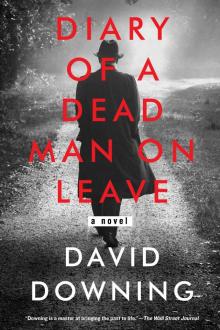 Diary of a Dead Man on Leave
Diary of a Dead Man on Leave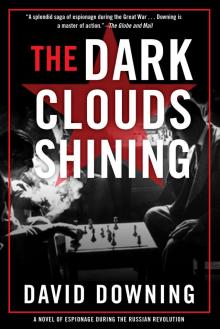 The Dark Clouds Shining
The Dark Clouds Shining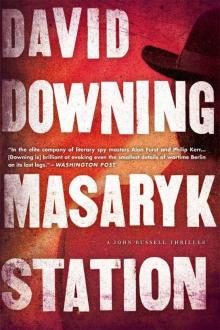 Masaryk Station (John Russell)
Masaryk Station (John Russell)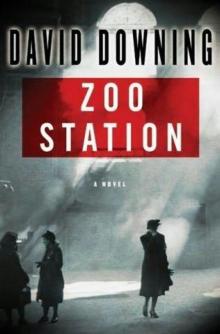 Zoo Stationee
Zoo Stationee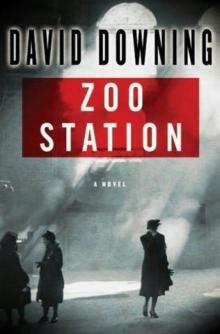 Zoo Station jr-1
Zoo Station jr-1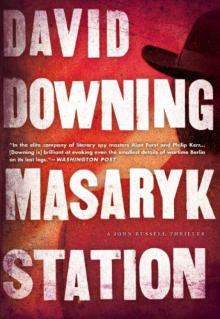 Masaryk Station
Masaryk Station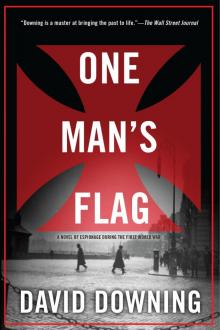 One Man's Flag
One Man's Flag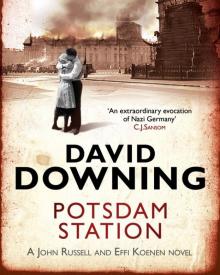 Potsdam Station jr-4
Potsdam Station jr-4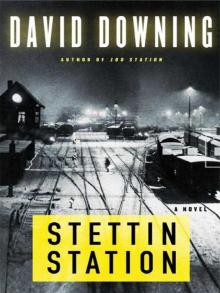 Stattin Station jr-3
Stattin Station jr-3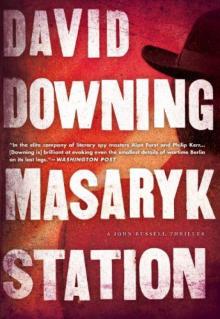 Masaryk Station jr-6
Masaryk Station jr-6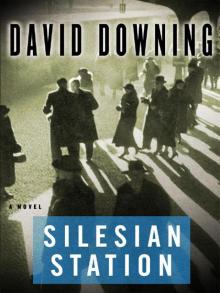 Silesian Station (2008) jr-2
Silesian Station (2008) jr-2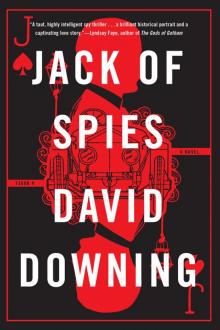 Jack of Spies
Jack of Spies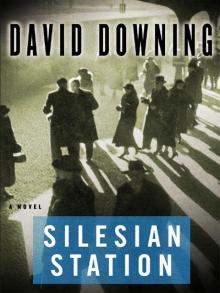 Silesian Station (2008)
Silesian Station (2008) The Moscow Option
The Moscow Option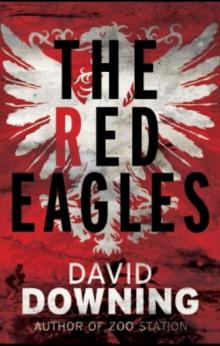 The Red Eagles
The Red Eagles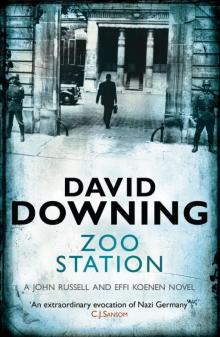 Zoo Station
Zoo Station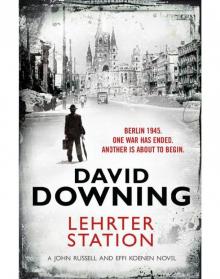 Lehrter Station
Lehrter Station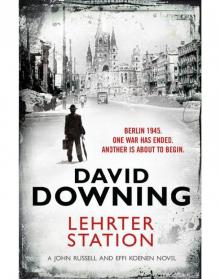 Lehrter Station jr-5
Lehrter Station jr-5